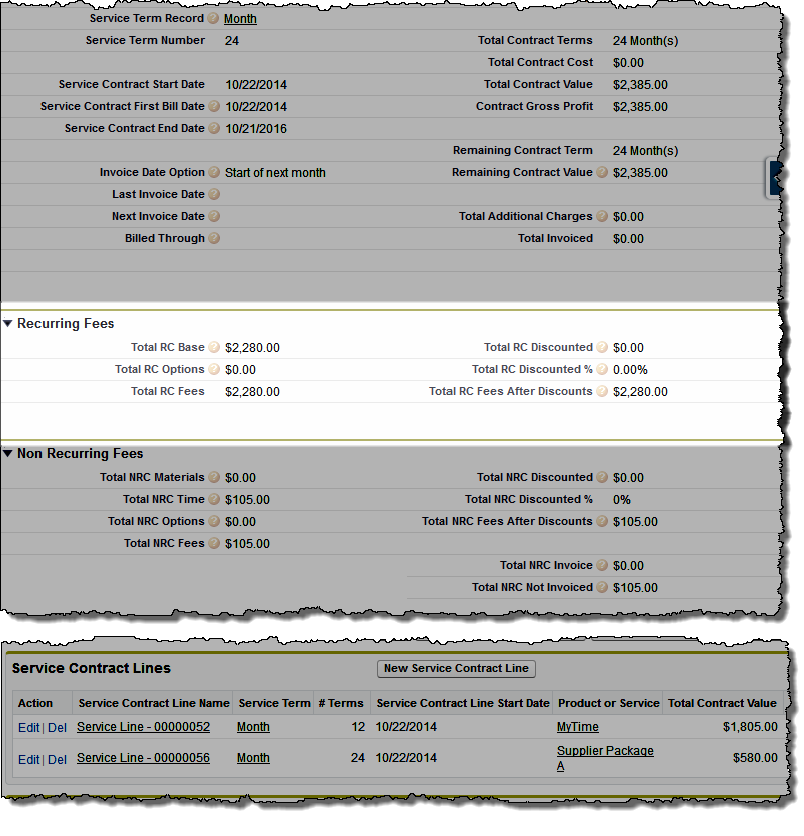Service contracts enable you to manage and invoice contracts that your organization has with its customers. You can create service contracts from customer quotations. You can create contracts with lines that start and finish on the same dates or you can create flexible term contracts that contain lines which start and finish on different dates.
Once a service contract has been approved and activated, you can make changes and additions to the contract by creating change requests.
A contract overview is displayed at the top of a service contract.
Perpetual Contracts
You can create perpetual standard service contracts that continue beyond their end date until you manually cancel the service contract. When the Perpetual Contract checkbox on a service contract is selected, the contract does not expire at the end of the last service term. The contract continues until you cancel it. Flexible service contracts cannot be created if the Perpetual Contract checkbox is selected.
In addition, perpetual contracts can be created by default depending on the configuration option your administrator has chosen. See the service contract setting Default The Pepetual Contract
Activated Contracts
Once a service contract is activated, several fields on that contract are updated when billing cycles take place including:
- Status
- Revision
- Total Contract Terms
- Total Contract Cost
- Total Contract Value
- Contract Gross Profit
- Total Additional Charges
- Total Invoiced
- Remaining Contract Term
- Remaining Contract Value
- Invoice Date Option
- Last Invoice Date
- Next Invoice Date
- Billed Through
Standard Service Contracts
On Standard Service Contracts, the number of service terms on an ordinary service contract determines the number of terms on each service contract line.

Service Contract First Bill Date
The service contract first bill date appears on the invoicing status section of the service contract header. The service contract first bill date default is the service contract start date. The service contract first bill date will not change if you change the service contract start date. You can edit the first bill date to suite your requirements, for example to avoid waived terms if the service contract start date has changed. If you subsequently change the contract start date you must revise the first bill date accordingly.
Total Contract Value
The value of the banner TCV Total Contract Value and the field level TCV in the service contract summary will be the same unless there are waived terms. Waived terms are added to the banner TCV when the Add Waived Terms to Service Term custom setting is selected and the first bill date occurs after the service contract start date.
Total Contract Value and the field level TCV in the service contract summary will be the same unless there are waived terms. Waived terms are added to the banner TCV when the Add Waived Terms to Service Term custom setting is selected and the first bill date occurs after the service contract start date.
Flexible Term Service Contracts
A flexible term service contract is a type of service contract that has lines with different start and end dates. You can change the term lengths for each service contract line within the contract so that billing can take place at different intervals to the contract terms. The number of terms in a flexible term service contract line determines the total fees for that line. The fees for each line are rolled-up to the parent service contract. For instance, a flexible term service contract might have two lines, one for 12 months and one for 24 months. Changing the number of terms in the parent service contract has no effect on the fees, total contract value and the number of service terms on the service contract lines. Waived terms are not supported in a flexible term service contract.

On a flexible term service contract, the same fields as a standard service contract are updated when billing cycles take place and a few additional ones are updated on service contract lines such as:
- Product or Service Description
- Quantity
- Service Terms
- Service Contract Line Start Date
- Service Contract Line End Date
- Service Contract Line Approved Date
- Service Contract Line Active Date
- Total Contract Cost
- Total Contract Value
- Contract Gross Profit
- Total Additional Charges
- Last Invoice Date
- Next Invoice Date
- Remaining # Terms
- Remaining Contract Value
